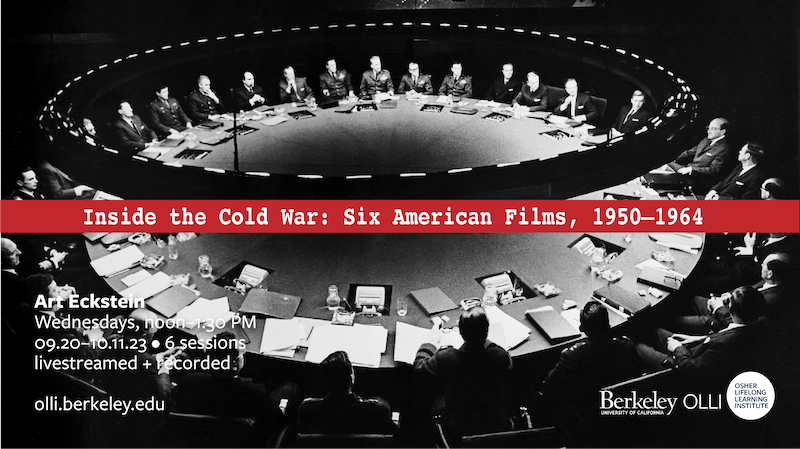Inside the Cold War: Six American Films, 1950–1964

The early years of the Cold War between the U.S. and the Soviet Union had a huge impact in Hollywood, from the purging of leftist writers to the production of anti-Communist films. Nuclear weapons on both sides meant that despite American prosperity in the 1950s, it was an age of great anxiety. (Remember “duck and cover!”?) Fear of annihilation — one-sided or mutual — set the mood and the stage.
In this course, we’ll look at films exemplary of the new anxieties besetting American culture and society in this period — and then two films exemplary of a new and growing culture of protest against the situation. We should note that Hollywood’s directly anti-Communist films never made money. This, too, tells us something about American culture in the early Cold War.
The films we'll discuss will start with a shocker:
- On the Beach (1959, dir. Stanley Kramer, starring Gregory Peck and Ava Gardner). The threat of all threats: planet-destroying nuclear war and human extinction.
Then, in the chronological order in which films were made, we will examine:
- My Son John (1952; dir. Leo McCarey; starring Helen Hayes and Robert Walker). The threat of internal Communist subversion.
- Strategic Air Command (955, dir. Anthony Mann, starring James Stewart and June Allyson). How to keep on an emergency war footing when there is no war? Intended as Air Force propaganda, but eventually banned at SAC bases.
- Invasion of the Body Snatchers (1956; dir. Don Siegel, starring Kevin McCarthy and Dana Wynter). Suburban anxieties: neighbors turned into pod-people.
Then we will see two films of growing protest against the situation:
- The Manchurian Candidate (1962; dir. John Frankenheimer, starring Laurence Harvey, Frank Sinatra, Janet Leigh). A satire on Communist “brainwashing” and fears of internal subversion. To be compared with My Son John (a decade earlier)
- Dr. Strangelove (1964, dir. Stanley Kubrick), starring Peter Sellers, Sterling Hayden), a satire on the threat of atomic war; to be compared with Strategic Air Command (a decade earlier), and the deadly-serious On the Beach.
Faculty Bio
Arthur M. Eckstein is a professor emeritus of history at the University of Maryland. His scholarship includes imperialism in the ancient and modern worlds. He is the author of many books, including The Searchers: Essays and Reflections on John Ford's Classic Western and Bad Moon Rising: How the Weather Underground Beat the FBI and Lost the Revolution.
This is a Livestreamed + Recorded Course
- Classes will stream live on the scheduled day and time.
- Classes will also be video recorded.
- Please note: Films should be viewed in advance. An optional reading list will be provided. Course sessions will consist of a 40-minute lecture on the background of each film, then a five minute break, and then a 45 minute period for discussion.
- Fee assistance is available if cost is a barrier. Learn more.
Schedule Highlights
- Course starts on Wednesday, Sept. 20 and ends on Wednesday, Oct. 25
- Classes meet for six weeks, 1.5 hours per session (noon–1:30 PM)
- Videos will post on Fridays in Member Dashboards
- All course materials, including videos, will be available to view and enjoy through Dec. 31
Member Praise for Art Eckstein
"Professor Eckstein's deep knowledge and passion for film was inspiring and gave me new insights."
"Great instructor! He was knowledgeable about history, politics, and psychology. He placed movies in context and provided personal experience in a very useful and entertaining way."
Faculty Q&A
- Read an interview with Art Eckstein from our archive.